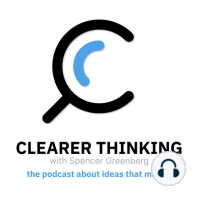58 min listen

Scientific Progress and Political Feedback Loops with Michael Nielsen
Scientific Progress and Political Feedback Loops with Michael Nielsen
ratings:
Length:
83 minutes
Released:
Nov 24, 2020
Format:
Podcast episode
Description
Is scientific progress speeding up or slowing down? What are the best strategies for funding research? What is "para-academia," and what are the pros and cons of being a para-academic researcher? What are the feedback loops in politics that cause politicians and their constituents to react to each other?Michael Nielsen is a scientist who helped pioneer quantum computing and the modern open science movement. He also has a strong side interest in artificial intelligence. All are part of a broader interest in developing tools that help people think and create, both individually and collectively. His most recent book is Quantum Country, an introduction to quantum computing. Find out more at his website, michaelnielsen.org, or follow him on Twitter at @michael_nielsen.
Released:
Nov 24, 2020
Format:
Podcast episode
Titles in the series (100)
Spencer Greenberg @ THINKERS Workshop by Clearer Thinking with Spencer Greenberg